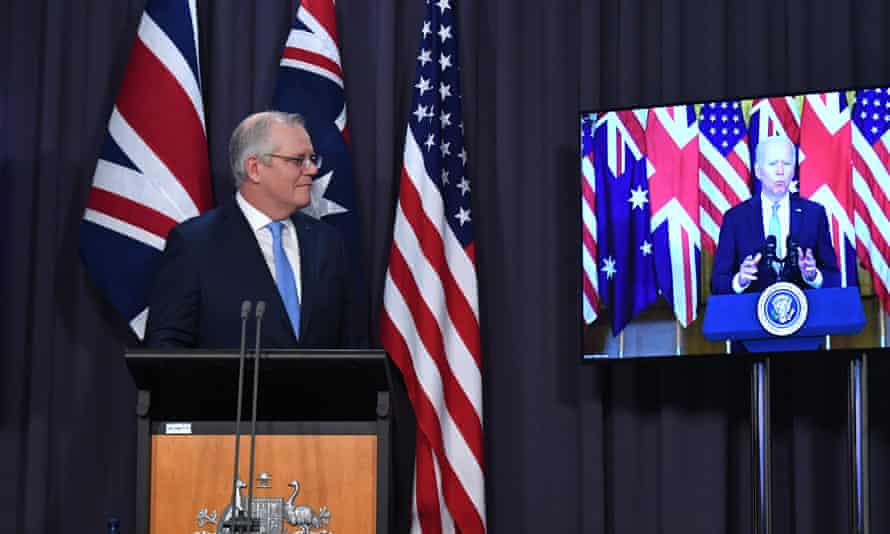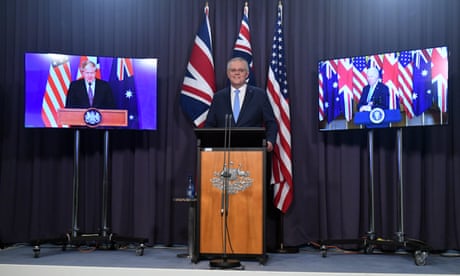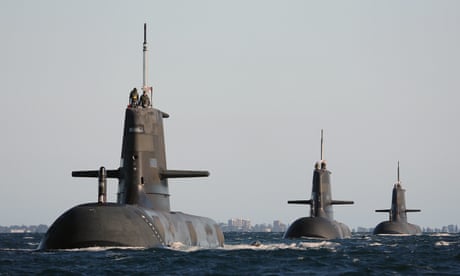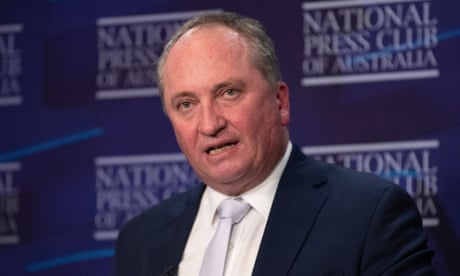Extract from The Guardian
The PM’s nuclear submarine ‘forever’ partners, Biden and Johnson, are on a backslapping unity ticket of ambition on combatting global heating.

Prime minister Scott Morrison’s announcing the Aukus pact with UK PM Boris Johnson and US President Joe Biden.
Last modified on Sat 18 Sep 2021 09.16 AEST
Scott Morrison flies to Washington next week. So does the British prime minister Boris Johnson. On current planning, Australia’s prime minister will see Joe Biden and Johnson in the US capital on Tuesday, and not on a screen, which feels strangely audacious from locked-down Canberra.
Morrison will fly into a diplomatically hectic week. The core purpose of his trip is to participate in the first face-to-face leaders meeting of the Quad – an informal security grouping of Australia, the US, India and Japan. Biden will host this group on Friday; a foursome of leaders orbiting around a cold war in the Indo-Pacific triggered by China’s increasing assertiveness.
Fronting the Quad is not the only item on Morrison’s dance card. The prime minister is expected to participate in a Biden-led summit about the pandemic and vaccines. The president is hosting this virtual event on the sidelines of the United Nations General Assembly. Reports suggest Biden will be asking political and business leaders to commit to vaccinating 70% of the world’s population by next September.
The Quad, scheduled for Friday, will also work up proposals on vaccines. A virtual meeting of this group in March ended with a promise to boost manufacturing to help low-income countries, and Australian officials are expecting leaders to emerge after the discussions next Friday promising a strong step up in vaccine development and delivery.

On current planning, as well as Biden’s pandemic summit and the Quad, Morrison will attend a reception marking the 70th anniversary of the Anzus alliance. He’ll have breakfast with the vice-president Kamala Harris and see the leaders of financial institutions, like the World Bank, as well as meeting members of key committees in the US legislature that deal with foreign affairs, intelligence and armed services.
Tuesday’s meeting with Biden will be the first grip and grin on US soil. Last time Morrison dropped by, Donald Trump indulged a dialogue with himself in the Oval Office about whether or not to launch a military strike against Iran, and Gina Rinehart floated through a Rose Garden soiree in a bejewelled white evening gown.
The coming visit will be important, but I suspect less surreal.
Morrison will see Johnson (who he saw in London earlier in the year) because Biden happens to be hosting the British leader next week (more on the why of that shortly). As well as the foursome, he’ll also have one-on-ones with Narendra Modi and Yoshihide Suga – who is on his way out of the prime ministership of Japan.
Obviously the coming trip had a significant prelude. Biden, Johnson and Morrison unveiled a new agreement to construct nuclear powered submarines – a deal these leaders cooked up in total secrecy. Morrison told Modi and Suga about the submarine agreement on Wednesday night before he told his own backbench.
In reality this new agreement is very thin. Morrison’s “forever partnership” right now is a handshake and a weird acronym. It’s an agreement to work out in 18 months whether or not an agreement can proceed.
Costs? Undisclosed, but astronomical. (Morrison told us cheerfully this week that defence spending was an elevator that would only go up). Delivery? A submarine in the water by 2040 – possibly – assuming this new bit of defence procurement isn’t a rolling botch-up, which would be a big assumption given the history in this country. And given our interim self-defence plan is patched up Collins-class vessels, and more frequent visits from our heavily armed friends, we can only hope China is generous enough to hold our beer until our lethal weapons arrive.
Morrison has just presided over a consequential point in time in Australia’s 21st century strategic policy. Thursday’s announcement, coordinated across the Pacific and the Atlantic, arrived like a thunderclap, because it is momentous.
Momentous, because before things went seriously south in Australia’s relationship with Beijing, there used to be lots of tut-tutting about false binaries when journalists asked if the time would come when Australia would have to chose between our most important security ally, and our largest economic partner.

This tut-tutting was reasonable to the extent that the question always had an obvious answer. Australia would always look to America if China’s nationalist-fuelled, grievance-laden bellicosity forced our hand. Liberal democracies are like that. They travel in packs. Middle powers need the protection of great ones.
But for a long time, Australia studiously avoided being explicit about the choice we would ultimately make. We wanted it both ways.
Well, that extended period of artful non-specificity is over. It’s over with a capital “O”. Australia is all in with the military complex of the US and Britain. We are a wholly owned subsidiary of the great powers in a dangerous region where escalating militarisation narrows the scope for transactional pragmatism between neighbours with different values and political systems.
That’s Australia’s reality.
It was our reality before this nuclear submarine pact threw it into sharp relief. The highly choreographed atmospherics of the deal voids any remaining grey area.
So the coming week will be about security, yes. But the other pressing issue of our time is global heating.
On that issue, Morrison’s nuclear submarine “forever” partners, Biden and Johnson are on a backslapping unity ticket of ambition, while Australia is still working out just how miserable we can be at the Cop26 in Glasgow without being heckled out of the room. After the tumult of the past week, perhaps the chief heckler will be Emmanuel Macron.
This didn’t get much attention, but a public statement issued after defence talks between the US and Australia late this week, interestingly, contained stronger language around climate action than we’d routinely see from Australia.
That statement committed the US and Australia to “enhanced actions during the 2020s with the aim of achieving net zero emissions as early as possible”. It acknowledged climate change was a “global security threat”. It committed the two governments to strengthening climate action ahead of the Cop “through ambitious nationally determined contributions, with 2030 targets”. On net zero by 2050, the language reflected Australia’s technology mantra. “Our joint ambition is to make low-emissions technologies globally scalable and commercially viable to rapidly accelerate global emissions reductions, enable clean growth, and make achievement of net zero emissions by 2050 possible”.
Australian officials say new climate commitments aren’t expected from Morrison next week, although there is some stakeholder talk about technology partnerships through the Quad and possible assistance from Australia to developing countries to finance low-emissions capability.
In terms of what Australia will ultimately say at Glasgow, the government is working to a timetable of an announcement in the middle of next month.
Senior US officials and Johnson have been happy to express displeasure with Australia’s unconscionable climate record in recent times.
It will be interesting to see if Biden chooses to apply a bit of polite public pressure to the visiting laggards next week.
I don’t know if Biden will go there or not.
But I do know there’s a glaring contradiction Morrison should address – and it’s this.

Why is Australia willing to be a wholly owned subsidiary of the US and the UK on military matters, trading away sovereignty, offering allies a blank cheque commitment on the rationale that prime ministers don’t keep receipts when they are saving the country from an existential threat?
But when it comes to another pressing existential threat, runaway global heating – a problem just as visible as the militarisation of the South China Sea – Australia can promise nothing unless Barnaby Joyce gets a spreadsheet identifying the precise costs of the transition for the average worker in Muswellbrook, and graciously grants his permission?
I mean, seriously. What a crock.
No comments:
Post a Comment